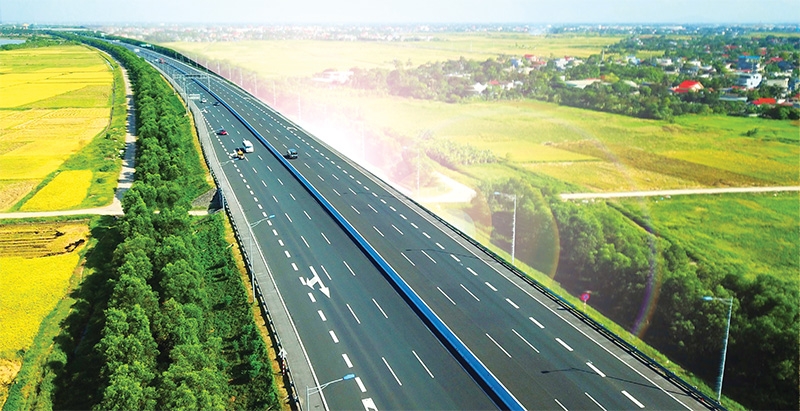Significant gains towards public investment goals
 |
| Capital disbursement of several state-funded infrastructure schemes has been sped up, photo Le Toan |
State-owned Electricity of Vietnam (EVN) reported that in the first 11 months of this year, its public investment disbursement reached nearly VND521.2 billion ($22.66 million), hitting 73.6 per cent as compared to the initial plan assigned by the government.
Of the figure, the capital disbursed for the group’s industrial activities was VND191.4 billion ($8.32 million), or 96.6 per cent of the initial plan.
The Ministry of Industry and Trade (MoIT), which manages EVN, also reported positive disbursement of public investment. Specifically, the total public investment for the MoIT to disburse in 2020 is VND293.48 billion ($12.76 million). Of which 71 per cent or VND208.7 billion ($9 million) has been realised before the end of November.
According to the Ministry of Planning and Investment (MPI), which is in charge of conducting state management over Vietnam’s public investment plans, the MoIT and EVN are big contributors to the country’s encouraging 11-month public investment disbursement picture, which reached 79.3 per cent of the initial plan and increased by 34 per cent on-year. This was also the highest 11-month rise in the 2011-2020 period.
As of late November 15 ministries and central agencies, as well as 18 cities and provinces, had a disbursement rate of over 75 per cent, including nine ministries and central agencies, and seven localities having a rate of more than 85 per cent.
For instance, Dang Ngoc Quynh, Deputy Chairman of Hung Yen People’s Committee, said that the northern province was given a sum of nearly VND6 trillion ($260.87 million) as public investment for 2020.
“In the first 11 months of 2020, the province disbursed close to VND4.3 trillion ($186.95 million), exceeding by 34 per cent of the initial disbursement plan assigned by the central government, and hitting 71 per cent of the plan assigned by the provincial government,” Quynh said. “Hundreds of infrastructure works have been constructed and put into operation. It is expected that the remaining investment capital will be fully disbursed by late December, with another 170 works to be put into operation.”
Meanwhile, according to the Ministry of Transport (MoT), the capital disbursement rate of some state-funded infrastructure projects of national importance has also been quickened.
For example, disbursement of some component projects of the eastern cluster of the North-South Expressway project hit over VND7.86 trillion ($341.74 million) out of the assigned VND10.82 trillion ($470.4 million) for 2020, or 72.6 per cent.
“Disbursement of public investment has been significantly improved,” stated Prime Minister Nguyen Xuan Phuc at the government’s cabinet meeting over a week ago. “This will contribute to the government’s efforts to achieve an economic growth rate of 2.5-3 per cent this year, and laying firm groundwork for next year’s higher growth.”
According to the Ministry of Finance (MoF), in the entire 2020, about VND633 trillion ($27.5 billion) worth of public investment must be disbursed. This sum includes VND470.6 trillion ($20.46 billion) assigned for this year and VND162.4 trillion ($7 billion) transferred to 2020 from 2019.
The MoF last week reported that in the first 11 months of 2020, the disbursement of official development assistance and concessional loans was VND6.31 trillion ($274.34 million), hitting 34.65 per cent of the initial plan and 45.51 per cent of the revised plan. This would mean that many projects have been delayed, and such assistance and loans may not be fully disbursed as planned for this year.
For example, according to an MPI report, a project to develop urban roads in the northern city of Haiphong, funded by the World Bank, was unable to disburse $13 million due to international consultants not being able to enter Vietnam to verify payments. In addition, the bidding activities of many projects using loans from the Export-Import Bank of Korea were disrupted because many South Korean surveyors were stuck at home.
“In addition, the COVID-19 pandemic has caused shortages of materials and equipment at construction sites as they are produced in and imported from many European and Asian countries. This has badly affected the implementation of bidding packages,” MPI Minister Nguyen Chi Dung said. “Projects in many localities, for example in the central city of Danang, had to halt implementation due to social distancing.”
What the stars mean:
★ Poor ★ ★ Promising ★★★ Good ★★★★ Very good ★★★★★ Exceptional
Related Contents
Latest News
More News
- Hermes joins Long Thanh cargo terminal development (February 04, 2026 | 15:59)
- SCG enhances production and distribution in Vietnam (February 04, 2026 | 08:00)
- UNIVACCO strengthens Asia expansion with Vietnam facility (February 03, 2026 | 08:00)
- Cai Mep Ha Port project wins approval with $1.95bn investment (February 02, 2026 | 16:17)
- Repositioning Vietnam in Asia’s manufacturing race (February 02, 2026 | 16:00)
- Manufacturing growth remains solid in early 2026 (February 02, 2026 | 15:28)
- Navigating venture capital trends across the continent (February 02, 2026 | 14:00)
- Motivations to achieve high growth (February 02, 2026 | 11:00)
- Capacity and regulations among British areas of expertise in IFCs (February 02, 2026 | 09:09)
- Transition underway in German investment across Vietnam (February 02, 2026 | 08:00)

 Tag:
Tag:




















 Mobile Version
Mobile Version